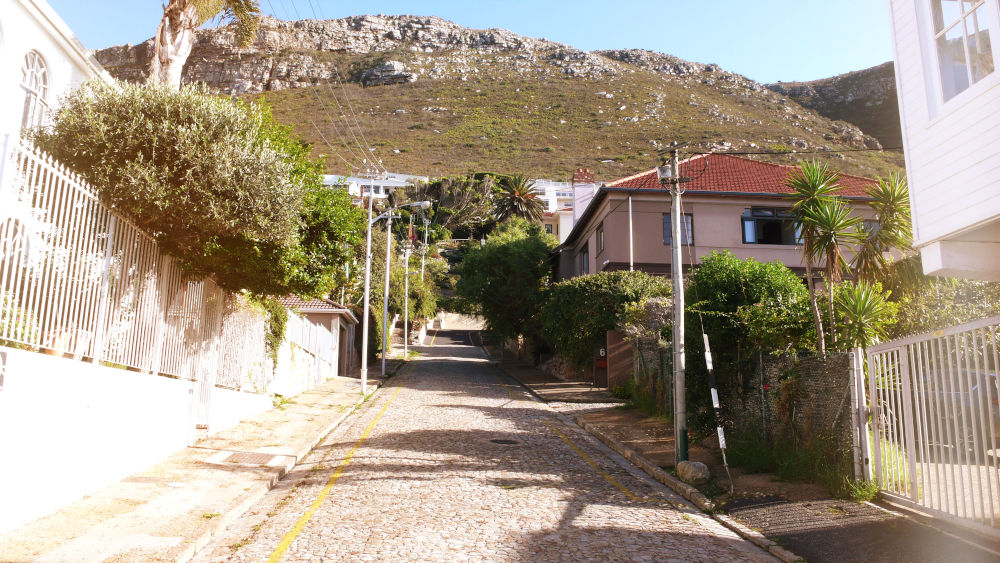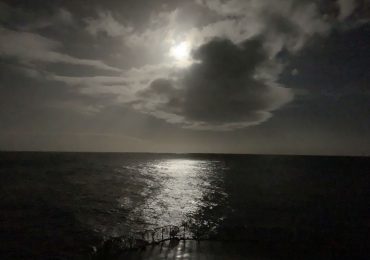The JRB presents a new short story by Byron Loker.
Cobbled Together: A Lockdown Story

I live now on a short, steep, cobblestone road in a tiny seaside part of Cape Town called St James. Our road is named after the suburb and it runs up from the ocean towards the mountain, then makes a ninety degree turn to the right, changes name, and comes to a dead end. Well, technically, before the right turn, it continues upwards via a zigzagging pedestrian path and then reaches to Boyes Drive via a flight of concrete stairs, but somehow that part of the road doesn’t concern us.
Since the start of the lockdown some of us in the four or five houses on the lower end of the road have been congregating every evening at eight o’clock to clap and cheer for the health workers fighting the pandemic. It was H.’s idea, meeting to clap. H. is my neighbour directly opposite at number six. When we met, within the first few days of my moving in, H. was walking from her driveway towards the front door of her house, carrying Woolworths packets full of groceries.
‘Are you new to the place?’ H. asked when she saw me parking my motorbike in the garage.
‘Yes, hi,’ I said, starting to walk across the road to meet her. ‘I’m B., I’m a friend of J. and M.’s, I’ve just moved in.’
‘I can’t shake your hand right now,’ H. said. ‘My hands are full. Nice to meet you, though. I’m H.’
‘Nice to meet you,’ I said, stopping where I was and making some sort of awkward wave, if I remember correctly.
J. is my friend M.’s mother and she’s eighty-seven years old now and very hard of hearing but still chipper as a sunbird and she let me move into her home for minimal rental as a favour to me and to M. She moved in with M. in Muizenberg to get away from the lingering presence of an older son who had been living in her house in St. James. Things had not gone well for him and he fell into trouble with the drugs and the selling of appliances to Cash Converters, and indulging in other antisocial behaviour. So, my friend M. changed the locks on the house and the last anyone heard from his brother he was in an internet café in Limpopo Province applying for entry-level jobs at the ANC.
I’m the poorest person ever to have lived on this stretch of coast sometimes referred to as ‘Millionaire’s Mile’, which is just off Main Road and a proverbial stone’s throw from the well-preserved or newly modernised manor houses and summer cottages of long-dead and now rather despised colonialists.
H. is a university professor and she’s in her sixties. She has long blonde hair and an intelligent border collie constantly by her side. In the year since she and I met, we’d had a few exchanges on our road, or on the beach where H. walked her dog every day before the lockdown.
Mostly we would say just, ‘Hello,’ or ‘How are you?’ to each other, but in the few weeks before the virus arrived and I kept losing my jobs and having trouble with public transport and my motorbike and money and my sense of humour, we were saying a little more to each other. H. was coming up with some good ideas to help me in my so-called career.
‘B.,’ she said one day early in the summer when we happened to run into each other again on Danger Beach and I told her about my latest tussle with unemployment, ‘why don’t you put up some notices on the boards at the university offering your editing services to PhD and masters students?’
‘That’s such a good idea!’ I said, ‘I’m definitely going to do that.’
I never did that. Another time when we passed on the road, H. asked, ‘How’s the writing going?’
‘Good!’ I lied. I had a new job paying next-to-nothing writing CVs for people in America (they call them resumes). ‘I have this job now writing resumes for people in America.’
‘No, not that, that’s just work, I mean the real writing,’ H. said.
‘Ah, it’s a case of diet starts on Monday,’ I said. My diets have been starting on Mondays for about the last ten years.
On the first night of the lockdown, H. called out from my gate and when I went out to greet her she said, ‘I know we probably shouldn’t, but do you want to take a walk with me up to the top of the road?’
‘Sure, great,’ I said, ‘good idea. Let me put some shoes on.’
We walked to the top of the steep part of the road and then started up the zigzagging part that doesn’t seem to concern us much.
I asked, ‘How long have you lived in St James?’
‘On and off for about twenty years,’ H. said. ‘This is a family house, a few of us share it. There was a period of about two years that I spent in Johannesburg, otherwise this is it. Home.’
I wanted to ask H. about the family house. I was on ‘hello’ and waving terms with some of the others I’d seen coming and going from number six, but then H. said, ‘We should probably lower our voices, in case somebody hears us and gets upset. We must be the only rebels in the street.’ We were about halfway up the zigzag and we stopped to catch a breath. ‘Yes,’ I said, ‘we should.’
‘Should we turn back?’ H. asked.
‘How about a little further?’ I replied, pointing upwards. ‘The driveway on the next landing.’
‘OK, good,’ H. said, and we walked on, the dog obediently to heel.
‘Do you know who lives here?’ I asked, indicating the mansion to our right. In a previous stay in the area I had come to know that the former ambassador to Turkey had lived there (he and I had once had words over the fence and exchanged terse letters about his barking dogs) before he was fired by the new South African government. Then the former ambassador to Turkey took the chip on his shoulder and set about living somewhere else—most likely not in a three-story mansion on ‘Millionaire’s Mile’—and running a photocopy and internet café type of shop in what was once the post office at the immediate end of our road.
‘It’s owned by an elderly man. We haven’t met, but there’s something suspicious about what’s going on there,’ H. said about the former ambassador to Turkey’s place. ‘There are Zimbabwean women coming and going. I don’t know much more about it but there’s something sad about it all, some sort of sex thing.’
We’d started walking back down the zigzag path and were passing number eleven when suddenly a motion-activated floodlight caught us in the act and made us kak our pants. At about the same time as the light exploded all over us, there was the loud clack of a gate unlocking by remote control and the ferocious barking of a dog—a German shepherd, we discovered, when we drew level with the now unlocked gate. The dog was running circles around itself in fury, or hunger, or whatever it is that drives large German shepherds berserk when they encounter lockdown fugitives in the night.
A man emerged from an open door somewhere deep behind the gate and the light and the berserk dog and said, ‘Come on, you guys, this is not acceptable, you shouldn’t be out here.’ It seemed rude not to say something about that even though we were beating a retreat, so I turned and said, ‘You’re right.’
H. said, ‘I agree,’ and we walked the rest of the short distance back to our homes in shame.
‘We stand corrected,’ I said with a laugh when we drew up to H.’s front door.
‘We do indeed. We won’t be doing that again then,’ H. said. ‘Of course, he has a point. If everybody went walking their dogs, then it defeats the whole purpose of the lockdown. I suppose we’ll just have to stick to our part of the road.’
‘Ja,’ I said, ‘Well, good night, H. See you tomorrow.’
‘Good night, B.,’ H. said.
*
The next day, or perhaps the day after, we met by chance on the road and started to shoot the breeze.
‘How’s the writing going now?’ H. asked.
‘Ah, it’s not,’ I said. ‘Too much work with the resumes—it’s much harder than I thought it was going to be. And there’s the screenplay deal I need to get on with. I have a long list of things I’m trying to do.’
‘If ever there was a time to make some headway with the writing, it’s now,’ H. said.
‘Ja, I know it,’ I said.
‘Maybe when you take a break from the computer, simply lie in the sun with a wet cloth over your face and think about what it is you want to write about,’ H. suggested.
I said, ‘OK.’
‘Write about the road,’ H. said. ‘What’s the one thing about the road that strikes you? Don’t answer that now. Just think about it. What’s the one, most significant thing. Don’t think too hard about it. Sleep on it. That’s what I do when I have a thing to think about for work, two strands that I need to tie together. I keep them in my mind, and then I go to bed, and when I wake up, I often know what the solution is.’
‘That’s very good,’ I said. ‘I tend to worry away at a problem incessantly and hardly ever solve it.’
‘Yes, that’s usually how it goes. But try it tonight, put something on your bed to remind you to do it.’
‘OK,’ I said, ‘I’ll do it.’
Two of our new neighbours joined us then. They’d been living on the road, at number one, for only a week and I had met them from a distance a few days before: we stood behind our gates and yelled at each other. ‘Hello! Welcome to the neighbourhood, I’m B!’ I said. And M. said, ‘Howzit! Thanks, I’m M., and this is K. There’s also D., who lives here too—K.’s boyfriend.’
So, it was K. and D. from number one who came over to H. and I standing on the road talking about putting two things together in the night to solve the problems with writing. K. is blonde and small and thoughtful and pretty; the kind of girl I’d fall in love with all the time back when I took the trouble to do such things. D., K.’s boyfriend, is tall and tanned even though it was winter and had long hair and an easy laugh. They both worked in the film business and had taken to making videos now for free for the food relief programmes in Ocean View.
I introduced H. to K. and D., and we talked a little about the coronavirus. K. and D. had just returned from a backpacking trip through the mountains of Nepal and a surfing expedition in Sri Lanka.
‘We’ve probably already had the virus,’ D. said. ‘We’re both fine. I’m finding it tough though, the confinement. And what I wonder about it is, if we’re struggling like this now, what’s it going to be like after the first week and beyond?’
‘Yes,’ I said. ‘I’ve lived alone for a long time, but this is different. This is a new kind of loneliness. We have to admit though, look where we live, there are worse places to be confined to one’s home. What about all those people in the country crammed into one-room shacks? What’s going to happen to them?’
We all thought about that for a little. D. said, ‘Maybe it’s up to those of us who have the privilege to do it, to hold the space for the rest. In a way, too, our generation has been expecting something like this. I suppose we didn’t expect it so soon, we all thought a coming crisis would have something to do with climate change, and that the effects of that were still a long way off, that we might have had time to prepare for it. Now, we don’t, a crisis is here, and we’re wondering how we cope with this.’
K. said, ‘We cope by being mindful. We make a conscious effort to be fully present in what we do. Take a shower and just focus on taking a shower. Cook food. Eat it mindfully.’
‘Yes,’ I said, ‘I like that.’
M., also from number one, came over to us then, a man of few words and many tattoos. We made some introductions, the group split. M. noticed a tiny, gated space between my place and number two. ‘Is this your space, B.?’ he asked.
‘No,’ I said, ‘this is S. and J.’s.’ S. and his wife J. lived at number two. J.’s name is the same as my landlady’s. ‘They have the keys.’
There was a large wooden planter box in the space and K. said, ‘It would be wonderful if we could all share this. We’ll tend to it, grow some herbs and vegetables. We can make it a communal effort.’
‘That’s such a cool idea,’ I said, ‘I’m sure S. and J. will be happy with that, you must ask them.’ M. had been looking at the space carefully. ‘Would be a great place to store some bicycles, and kayaks, maybe.’
‘Sure,’ I said, ‘that’ll work.’
‘Maybe we can put up a shed or something,’ K said.
‘Ja,’ I smiled and said, ‘add a second storey. Get a few tenants. Split the income.’
We laughed a little at that.
K. and D. had their small dog with them, a cross-breed Jack Russell named Charlie who was minding his own business, sniffing the ground, when H.’s dog approached him warily. Both dogs arched their backs, dropped their tails towards the ground, and circled each other.
‘Be nice,’ H. said to her dog.
‘It’s fine,’ K. said, ‘Charlie can hold his ground with the best of them.’
‘How old is he?’ H. asked.
‘Fourteen,’ K. replied.
‘Wow, that’s good going. My dog is twelve. Look at them, each presuming to be the alpha male, stamping his authority,’ H. said. The dogs finished sniffing each other’s asses and lost interest in that and moved on to their own wanderings up and down the road.
*
The next night, or it might be the one after, we met at eight for the clapping for the medical workers, and A. came too. A. also lives at number six, with H., apparently in the back part, in a beautiful glass house with a vegetable garden and a view of the ocean. It was A.’s birthday that day.
W. came, too. W. also lives at number six—there are quite a number of people living at number six. W. is in her seventies and it turned out she’s E.’s sister. E. also lives there at number six. H. introduced me to E. once and I misheard his name at the time—I’d been calling him the wrong name since.
W. brought a pot and a wooden spoon to bang. Someone—I think M.—somehow had a cowbell over at number one and we heard it clanging along as we clapped and W. banged the pot. Then we sang happy birthday to A.
Y. from number ten was also there that night. Y. is seventy-seven, with short grey hair and a penchant for storytelling in the minutest detail. She once thwarted a mugging on our road by kicking a mugger in the chest and then chasing him and another would-be mugger down with the help of a passing motorist who tracked them to one of the bathing boxes on the beach where they were eventually arrested by a passing Mountain Man. There’s a story about Y. online; they called her the ‘ninja granny’ and the mayor’s office sent some of his people to visit her for tea and thank her for keeping our street crime-free. It took us two full sessions of eight o’clock clapping to hear that story. The first of those nights was a cold, breezy one and Y. had a thick scarf wrapped around her face because she had just recovered from pneumonia. ‘We don’t recognise you in your ninja attire, Y.!’ H. said.
‘Well, funny you should mention the word ninja, H.,’ Y said, ‘Did I tell you about the time two miscreants tried to take my handbag?’ So that was the first of the two nights we heard the story about the two kids who tangled with the wrong senior citizen.
‘Do you have brothers and sisters?’ I asked A.
‘Two brothers,’ A. said. ‘Two big, strapping boere. I miss my family very much.’
‘Are they in Cape Town?’ I asked.
‘Hermanus,’ A. replied.
About then S. came out to his front gate to see about his dogs barking up a frenzy at the now-illegal congregation on the road. ‘Why do my dogs have to be the noisiest in the neighbourhood,’ S. said. It was a rhetorical question.
‘Well, you know, S.,’ H. said, ‘we might have a problem with it if you weren’t the most charming man in the neighbourhood. I suppose it’s because we have our dogs out in the road that yours are barking so much.’
There was a loud fluttering in the tree just inside S. and J.’s yard and we stopped talking and all had a close look at the tree by the light of the streetlamps, which are very bright and the light very orange.
‘It looks like some sort of raptor,’ S. said, staring into the leafy mass of the tree.
‘It’s in distress,’ J. said. ‘Maybe it’s stuck, we need to get a ladder and help it.’
‘We need to just leave it alone,’ S. said. ‘It’s probably fine.’
One of the security guards who patrols our area came by just then. I call the security guards the Mountain Men, which was the original name of the security company that came up with the idea of stationing guards on the lower slopes of the mountain above our homes where they are able to thwart muggings and robberies with a pair of binoculars and a walkie-talkie.
Anyway, we waved to the security man doing his rounds, which we did every night with a certain amount of guilt because we lived on ‘Millionaire’s Mile’ while a Mountain Man sat all night on the mountain trying to keep our road safe from South Africa’s horrendous oversupply of robbers, rapists, muggers, and women-murderers, probably for not much pay.
‘Don’t tell the army we’re having a public meeting in the street,’ I said to the Mountain Man man. ‘I’m not fit enough to do push-ups, or that frog-hopping thing the army makes you do if they catch you on the streets during lockdown.’
Some of us chuckled. ‘Frog hopping?’ H. asked.
‘Ja,’ I said. ‘There’s video doing the rounds of soldiers forcing people to do this weird hopping movement down the pavement for no good reason.’ There wasn’t much anyone could say about that, so no one did.
‘A robin got into my kitchen the other day,’ H. said.
‘The bird life is flourishing under the lockdown,’ Y. said.
S. moved to the huge rosemary bush on H.’s property, some of which spills on to the road-side, and pulled a few twigs off. ‘For the pasta tonight,’ he said, ‘we seem to have a surplus of the stuff in the pantry.’
‘Ooh, sounds fantastic,’ H. said, ‘Rosemary goes with everything.’
‘One of my favourite meals,’ S. said, ‘is simply two soft-boiled eggs, fresh soughdough bread, and just a sprig of rosemary.’
‘Delicious,’ H. said.
‘The Dalebrook Café does good poached eggs, with avocado,’ I said, for no good reason except that I was very hungry and that was the last good meal I can remember eating in a restaurant. ‘I made pasta last night,’ I said. ‘Just pasta though, and some butter, and some herbs from my pot plants.’
‘Have you run out of food?’ H. asked.
‘No,’ I lied, ‘I stocked up today.’ There was R5.31 in my bank account. I checked. So, I wasn’t sure if there was ever to be any stocking up again, but it certainly wasn’t to be that day.
‘Well,’ S. said, ‘best I go and get dinner started, the family will be getting hungry. After supper, a show on Netflix.’
‘I’m watching a show called Monarca,’ H. said, ‘I think you’ll love it.’
‘Monarca?’ S. asked. ‘I’ll add it my list. Well, good night, see you all tomorrow night maybe.’
K. and D. had also drifted home by then. A. and W. too. So, it was just H., Y., and I left on the road. Y. had read my book—the short story collection that sank without a trace—and she asked me, ‘How’s the writing going by the way? This is a good time, if ever, to get some writing done.’
‘Ah,’ I said, ‘it’s not going at all. I think I’ve given up.’
‘That’s a great pity,’ Y. said, ‘I hope you haven’t.’
‘That’s not quite true,’ H. said, ‘you are writing about the road now, aren’t you?’
‘What’s that?’ Y. asked, either because she wanted to know what it was I was maybe writing about, or because she hadn’t heard what H. had said.
‘He’s writing about us during the lockdown, a story about the, the … cobbles,’ H. said, pointing down at the surface of the road. ‘Hey, that’s it, B., the title for your story, something about the cobbles, as in, when you cobble something together, there’s—’
‘These cobbles, this road, is over a hundred years old,’ Y. said.
‘That’s remarkable!’ I said, glad for the change in subject. ‘I was thinking about that the other day, look how it still has its camber,’ I said, making a hump motion in the air with my hand as if H. and Y. wouldn’t know what the word camber meant.
‘Indeed,’ Y., said, moving a little way off and bending over to inspect the road surface. ‘If the cobbles are laid right, this road should last a hundred years more. They need to be set in like teeth, you know, carved with a root-like shape for the part that’s buried into the ground. Look here,’ she said, pointing at the road where she had found what she was looking for: ‘Concrete. This shows that the council people making repairs don’t know anything about cobblestones roads. If you lay the stones in right, you don’t need concrete like this. It spoils everything. It’s a shame really.’
H. and I went over to where the concrete was spoiling everything and we stood there looking at it. There seemed nothing more to say about that. After a while H. said, ‘Well, folks, I think I’m going to bed. Thanks for the chat. Good to see you both and let’s do this again tomorrow night.’
‘Yes, well, see you tomorrow then, good night,’ Y. said, backing up the road towards her drive, while I parted from them downwards, towards my gate.
‘Good night, Y. and H.,’ I said, ‘see you tomorrow,’ and I went back into the house where I live for now, lay down on the couch and took up the television remote control.
- Byron Loker is the author of New Swell (2006), a short story collection. Follow him on Instagram.






this Byron Loker ou spins such a lekker yarn. Bravo! Another one please.